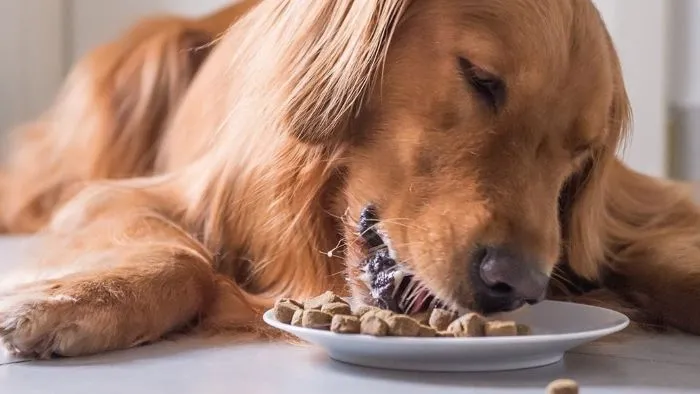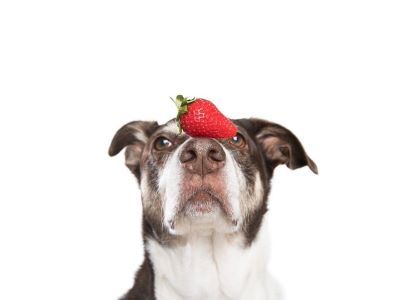Do you ever think💭 what can I feed my dog instead of dog food? We all want our dogs to eat well, just like we do. While there’s special dog food you can buy, some people like to make their dog’s meals from scratch.🐶
So, what can you feed your dog instead of the usual dog food, and how can you make sure they get all the good stuff they need to stay healthy and happy?
Worry not, we are here to help you understand simple food options and things to think about when you want to give your dog a homemade meal that’s good for them.

What Can I Feed My Dog Instead of Dog Food?
“It’s essential to provide a well-rounded diet that includes: Proteins🥩, Carbohydrates🍞, Fats🧈, Vitamins💊, Minerals, and Adequate hydration💧 with water for your dog’s optimal health. Ensuring that the dog gets complete and balanced nutrition is our responsibility” confirms experts at WebMD
Homemade diets can work well for some dogs, but it’s crucial to ensure they receive all the necessary nutrients🥗. Create a suitable diet plan tailored to your dog’s specific needs, here are some suggestions:
1. Protein Sources
As pet the experts at PetMD,” Proteins are one of the most vital parts of your dog’s diet, serving as the building blocks for their muscles💪, tissues, enzymes, and hormones.” When you’re considering protein sources for your dog’s food, it’s important to think about variety and quality to ensure they receive a well-rounded diet.
Lean Meats
Here are some lean meat protein options:
- Chicken: Skinless, boneless chicken breasts or thighs are excellent sources of lean protein for dogs. Avoid bones and seasoning.🍗
- Turkey: Similar to chicken, turkey offers lean protein and can be a tasty addition to your dog’s diet.🦃
- Beef: Lean cuts of beef, such as sirloin or ground beef with low-fat content, can provide a variety of protein sources.🥩
- Pork: While pork can be given in moderation, opt for lean cuts like pork loin to reduce fat intake.
- Fish: Salmon, mackerel, and other fatty fish are rich in protein and omega-3 fatty acids, promoting a healthy coat and skin.🐟

Eggs
Eggs are a fantastic source of complete protein and can be given to your dog either boiled or scrambled. The eggshell can also be ground into a powder to provide calcium.🥚
Dairy
Let’s see some dairy options to suffice as proteins:
- Plain Yogurt: Greek yoghurt or plain yoghurt without added sugars or flavours can provide probiotics and protein.🥛
- Cottage Cheese: This dairy product is low in lactose and can be a good source of protein.🧀
Note: Portion control is the key🔑, and the protein content should be balanced with carbohydrates and fats to meet your dog’s🐶 specific dietary needs.
2. Carbohydrate Sources
Carbohydrates serve as a valuable energy source for dogs and can contribute to a well-rounded diet when used in moderation. While dogs are primarily carnivorous, they can digest and benefit from certain carbohydrates. Here are some options for carbohydrate sources in dog food:
Vegetables
Carrots🥕 are rich in vitamins and fibre, making them a healthy carbohydrate source that can support digestive health. Peas provide dietary fibre, protein, and essential nutrients like vitamins A and K.
Sweet potatoes🍠 are a great source of complex carbohydrates and are packed with vitamins, including A and C[1]. These low-calorie vegetables offer fibre and vitamins, promoting a feeling of fullness.
Plain, canned pumpkin🎃 (not pumpkin pie filling) is rich in fibre and can aid in digestion.
Fruits
Here are some suggestions for fruits:
- Apples: Apples are a source of dietary fibre and can be a crunchy, low-calorie treat for dogs. Be sure to remove seeds and core, as they contain cyanide, which can be harmful.🍎
- Blueberries: Blueberries are packed with antioxidants and provide a natural sweetness in moderation.🫐
- Bananas: Bananas are a source of potassium and can be given as a healthy treat. However, they are calorie-dense, so moderation is key.

- Watermelon (seedless): Seedless watermelon is hydrating and contains vitamins like A, B6, and C, but should be given in moderation due to its high sugar content.🍉
Grains
Rice (white or brown) is a bland and easily digestible source of carbohydrates, often recommended for dogs with digestive sensitivities. 🥣
Oats are rich in fibre and can be soothing for dogs with stomach issues. Quinoa is a complete protein source and contains essential amino acids, making it a nutritious addition to your dog’s diet.
Supplements
Supplements for dogs can be valuable additions to their diet, but it’s crucial to use them judiciously and only under the guidance of a vet.👨⚕️ Here’s an informative expansion on three common supplements for dogs:
1. Calcium
Calcium is essential for maintaining strong bones🦴 and teeth, as well as supporting various bodily functions like muscle contraction and nerve transmission[2].
While most commercial dog foods contain adequate calcium levels, supplementation may be necessary for specific cases like pregnant or lactating dogs, growing puppies, or dogs with medical conditions requiring additional calcium.
2. Multivitamins
Multivitamins are designed to fill potential nutrient gaps in your dog’s diet and ensure they receive essential vitamins and minerals. These are often recommended for dogs on homemade diets or those with dietary restrictions that may lack certain nutrients.💊
They can be beneficial for dogs with health conditions or those unable to absorb nutrients properly. Giving your dog too many vitamins can be harmful, so follow your vet’s recommendations closely.
3. Glucosamine and Chondroitin
Glucosamine and chondroitin supplements are commonly used to support joint health in dogs[3], particularly in ageing or arthritic dogs. They help maintain joint cartilage and reduce inflammation.
These supplements are often recommended for dogs with joint conditions or breeds prone to joint issues. This can also be beneficial for active dogs to maintain joint health.
Treats
Treats play an important role in rewarding🏆, training, and bonding with your dog. However, it’s essential to choose treats wisely to ensure they contribute positively to your dog’s health. Here are some suggestions:
Homemade Dog Treats
Making homemade dog treats gives you complete control over the ingredients, allowing you to tailor them to your dog’s specific dietary needs or preferences.
Homemade treats are often fresher and free from preservatives or artificial additives, which can be healthier for your dog. They can be stored in airtight containers or frozen for future use, maintaining their freshness.
Commercial Dog Treats
Commercial dog treats are readily available and convenient for busy dog owners. They come in various shapes, sizes, and flavours to suit different preferences. Commercial treats provide a wide range of flavour options to cater to your dog’s taste preferences. Commercial dog treats often contain enticing flavors like dog gravy granules that appeal to canine taste preferences.

When it comes to feeding our furry friends, most dog owners opt for store-bought kibble. But have you ever wondered exactly what is kibble dog food?
Foods to Avoid
Prevention is the best approach, so always be mindful of what your dog has access to. If you suspect your dog has ingested any of these toxic foods, contact your vet. And here are some foods to avoid:⛔
- Chocolate: It contains theobromine and caffeine, which are toxic to dogs. Dark chocolate and cocoa powder have higher levels of these compounds and can be especially dangerous. Ingesting chocolate can lead to symptoms like vomiting, diarrhoea, rapid breathing, increased heart rate, seizures, and even death in severe cases. 🍫
- Grapes and Raisins: Grapes and raisins, although healthy for humans, are highly toxic to dogs and can cause kidney failure. Even a small amount can lead to symptoms like vomiting, diarrhoea, lethargy, and loss of appetite.🍇
- Onions and Garlic: Onions🧅 and garlic, whether raw, cooked, or in powdered form, contain compounds that can damage a dog’s red blood cells, leading to a condition called hemolytic anaemia. Symptoms may include weakness, vomiting, diarrhoea, and, in severe cases, organ damage.
- Xylitol: This is a sugar substitute found in many sugar-free and low-sugar products, including gum🍬, candies🍭, baked goods, and some peanut butter brands. Xylitol can cause a rapid release of insulin in dogs, leading to a dangerous drop in blood sugar (hypoglycemia), which can result in seizures or even death.
- Avocado: Avocado contains a substance called persin, which can be toxic to dogs, especially in larger quantities. While the flesh is generally less harmful, the pit, skin, and leaves contain higher concentrations of persin and should be avoided.
It’s important to read dog food labels carefully and understand what the ingredients are. For example, ash is listed on many dog food labels, but what is ash in dog food exactly?
FAQs
What Can I Feed My Dog if She Won’t Eat Dog Food?
Human food like chicken or even baby food may be so irresistible that your dog will actually eat something. Try just a small amount of human food at first to see if they will eat. If not, try adding a bit more.
What Can I Feed My Dog Instead of Dog Food?
Bananas, Blueberries, Broccoli, Carrots, Cooked boneless lean meat (chicken, beef, or turkey), Onion-free gravy for taste, Plain boiled rice, and Plain, unprocessed oatmeal.
What Can I Feed My Dog to Fill Him Up?
Try treating your dog with raw cucumbers, carrots, broccoli, or celery. You can also try boiling them first to break down some of the insoluble fibre.
Summary
When it comes to feeding your dog, there are choices beyond regular dog food. You can make meals from scratch using good ingredients like lean meats and veggies or try homemade treats and special supplements. But the big question is: What can you feed your dog instead of dog food?🥣
To figure that out, it’s crucial to understand your dog’s unique needs. So, whether you go for homemade meals or stick with store-bought dog food, the main goal is the same: keeping your canine companion healthy and happy.🐶
By making sure your dog gets the right mix of proteins, carbs, fats, vitamins, minerals, and plenty of water, you can give them a yummy and nutritious diet that keeps their tail wagging with joy.💖
Reference:
- Department of Health & Human Services. (n.d.-c). Vitamins and minerals | Better Health Channel.
- National Academies Press (US). (2011). Overview of calcium. Dietary Reference Intakes for Calcium and Vitamin D | NIH
- Staff, A. (2022). Can glucosamine for dogs help treat arthritis and joint pain? | American Kennel Club.



